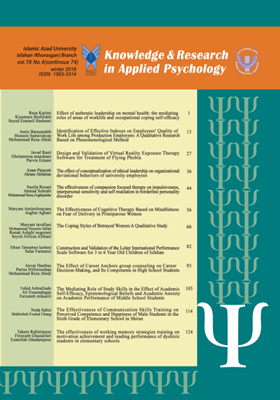The effect of conceptualization of ethical leadership on organizational deviational behaviors of university employees
Subject Areas : EducationalAzam Pirayesh 1 , Akram Akbarian 2 *
1 - Department of Public Administration, Isfahan (Khorasgan) Branch, Islamic Azad University, Isfahan, Iran.
2 - Young Researchers and Elite Club, Isfahan (Khorasgan) Branch, Islamic Azad University, Isfahan, Iran.
Keywords: organizational deviational behaviors, Ethical Leadership, ethical leading &, employees of Isfahan (IAU),
Abstract :
Analyzing the effect between conceptualization of ethical leadership and organizational deviational behaviors has been the objective of this research. This study has been done based on the descriptive method of correlational kind. The statistical population of this study has been included all of the employees of Isfahan (IAU) who were 320 employes. Employees were selected randomly as sample. The standard questionnaire of Ethical Leadership (Kalshonand et al., 2011) and the standard questionnaire of Deviational Behaviors (Bent and Robinson and et al., 2008) were included in the research`s tools. The multiple regression`s tests was used. Results showed that the conceptualization of ethical leadership has a significant effect on deviational behaviors is negative and significant which is as (p≥0.01, r=-0.290). Therefore, the hypothesis of the effect of conscientiousness on deviant behavior is not confirmed and the hypotheses of the effect of dimensions of popular orientation, knowledge sharing, stability, role resolution, moral guidance, fairness of moral leadership on deviant behaviors are not confirmed.
ارشدی،ن؛ پیریایی، ص؛ زارع، ر.(1391). نقش تعدیلکننده صفات شخصیتی در رابطه بین ادراک طردشدگی در محیط کار و رفتارهای انحرافی محیط کار، مجلة علوم رفتاری، 6 ، 3 ، 230 – 221.
قاسمزاده علیشاهی، آ، ربیعی، م و کاظمزاده بیطالی، م.(1394). بررسی رابطة پاسخگویی فردی با استرس شغلی و رفتار انحرافی کار در پرستاران شاغل، مجلة بالینی مامایی و پرستاری، 4، 1.
فلاحی، ع.(1392). رابطه بین فشارزاهای شغلی و رفتارهای انحرافی با نیت ترک شغل در کارکنان پارس جنوبی. پایاننامة کارشناسی ارشد. دانشکده روانشناسی و علوم تربیتی مرودشت.
منتخب یگانه، م؛ بشیرلو، ک؛ شمسی، م و هزاریان، س.(1395). بررسی رابطة رهبری اخلاقی با رفتارهای انحرافی در محیط کار: نقش میانجی تعهد عاطفی و جو اخلاقی، فصلنامة مدیریت فرهنگ سازمانی، 14، 1، 153-137.
مهداد، ع؛ ذاکرین، س؛ مهدیزادگان، ا.(1392).اثر تعدیلی ویژگیهای شخصیتی بر رابطة بین عدالت سازمانی ادراک شده و میل به بروز خشونت در محیط کار، مجلة دانش و پژوهش در روانشناسی کاربردی ، 14 ، 2 ، 78- 69).
Brown ME, Trevino LK, Harrison DA. (2005). Ethical leadership: A social learning perspective for construct development and testing. Journal of Organizational Behavior and Human Decision Processes, 97: 117-134.
De Hoogh, A.H.B., Den Hartog, D.N. (2008); Ethical and Despotic Leadership, Relationships with Leader's Social Responsibility, Top Management Team Effectiveness and Subordinates' Optimism: A Multi-Method Study, The Leadership Quarterly,. 19, 3,. 297-311,
Lin Hsiao-Fang. (2013). The Well-Being of Junior High School Students in Taiwan in Relation to Familial Socioeconomic Status, School Life Adjustment, and Deviant Behavior. Psychology, 3, 217-223.
Mayer D.M., Kuenzi M., Greenbaum R., Bardes M. and Salvador R. (2009). How low does ethical leadership flow? Test of a trickle-down model. Organizational Behavior and Human Decision Processes, 108: 1-13
Özbağ, Gönül Kaya. (2016). The Role of Personality in Leadership: Five Factor Personality Traits and
Ethical Leadership, 12th International Strategic Management Conference, ISMC 2016, 28- 30
October 2016, Antalya,Turkey, Social and Behavioral Sciences 235 (2016) 235 – 242.
Resick,C.,Hanges,P.,Dickson,M.,and Mitchelson,J. (2006). A Cross-Cultural Examination of the Endorsement of Ethical Leadership,Journal of Business Ethics 63,pp.345-359.
Robinson Sandra L, Bennett Rebecca J. (1995). A Typology of Deviant Workplace Behaviors: a
Multidimensional Scaling Study, Academy of Management Journal. 38/2: 555-572.
Spector Paul E, Fox Suzy. (2010). Theorizing about the deviant citizen: An attributional explanation of the interplay of organizational citizenship and counterproductive work behavior. Human Resource Management Review, 20, 132-143.
Salami Samuel O. 2010. Job Stress and Counterproductive Work Behaviour: Negative Affectivity as a Moderator. The Social Sciences, 6, 486-492.
Trevino LK, Weaver GR, Reynolds SJ (2006). Behavioral ethics in organizations: A review. Journal of Management, 6: 951- 990.
Tuncdogan, A., Acar,O. A. & Stam D. (2016). Individual differences as antecedents of leader behavior: Towards an understanding of multi-level outcomes, The Leadership Quarterly
Walumbwa, F.O., Wang, P., Wang, H., Schaubroeck, J., Avolio, B.J. (2010); Psychological Processes Linking Authentic Leadership to Follower Behaviors, The Leadership Quarterly, Vol. 21, Issue 5, pp. 901-914, Available from: http://dx.doi. org/10.1016/j.leaqua. 2010.07.015.
_||_
